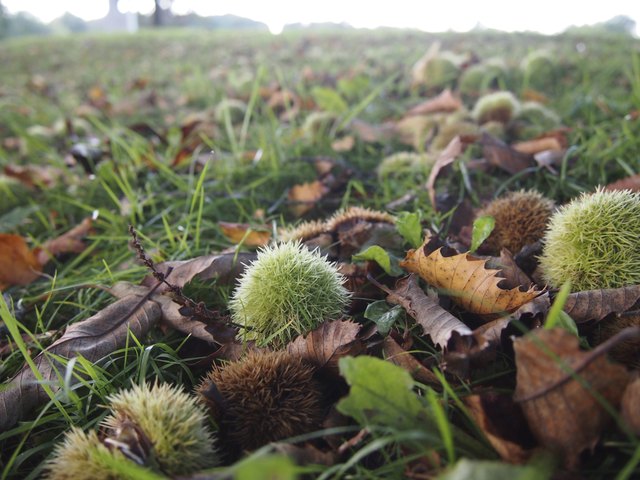Don’t miss this What Are The Green Balls That Fall From Trees article containing the interesting information you’re looking for, all carefully summarized by us.

What Are the Green Balls That Fall From Trees?
As a child, I loved spending time in the backyard, playing under the shade of our grand old oak tree. One day, I noticed something peculiar: small, round, green balls littering the ground beneath its branches. Curious, I picked one up and examined it closely. It was smooth and slightly squishy, with a faint, earthy scent.
My mother, who had been watching me from the kitchen window, smiled and came outside. “Those are acorns,” she explained. “They’re the seeds of the oak tree.” So began my fascination with these enigmatic green orbs that fall from trees, carrying within them the potential for new life.
The Mighty Acorn
An acorn is the fruit of oak trees belonging to the Quercus genus. These trees are majestic and long-lived, often reaching heights of up to 100 feet and living for hundreds of years. Acorns are an iconic symbol of strength, resilience, and wisdom, and have been revered by many cultures throughout history.
The outer shell of an acorn, called the cupule, encloses a single, edible seed. Acorns are rich in nutrients, including carbohydrates, proteins, fats, and fiber, making them a valuable food source for wildlife, such as squirrels, birds, deer, and even bears.
The Journey of an Acorn
In the fall, as temperatures begin to drop, oak trees drop their acorns to the ground. These acorns contain an embryo, which is protected by the hard shell of the cupule. The embryo remains dormant through the winter months, waiting for the right conditions to germinate and grow.
When spring arrives, the embryo inside the acorn senses the warmer temperatures and increased sunlight. It begins to grow, sending out a root down into the soil and a shoot up towards the surface. With access to water and nutrients, the young oak tree begins its long journey towards maturity.
The Cultural Significance of Acorns
Acorns have held a special place in human cultures for centuries. Native American tribes relied heavily on acorns as a food source, and used them to make flour, bread, and other dishes. Acorns were also used to make medicinal teas and ointments.
In many European cultures, acorns were associated with wealth and prosperity. They were often used as decorations in homes and churches, and were sometimes even used as a form of currency. The acorn is also a symbol of fertility and new beginnings, and is often used in jewelry, art, and literature.
Modern-Day Uses of Acorns
Today, acorns are still used as a food source in some cultures, and are becoming increasingly popular as a gluten-free and vegan alternative to wheat flour. They are also used in animal feed, and are sometimes roasted and used as a coffee substitute.
In addition to their culinary uses, acorns are also being explored for their potential medicinal properties. Studies have shown that acorns contain antioxidants and anti-inflammatory compounds, and may have potential benefits for heart health, diabetes, and other conditions.
Tips and Expert Advice for Understanding Acorns
- Observe oak trees throughout the year. Notice when the acorns fall, and how they change appearance over time.
- Collect acorns and examine them closely. Look for different sizes, shapes, and colors.
- Read books and articles about acorns. Learn about their cultural significance, nutritional value, and ecological role.
- Talk to experts about acorns. Ask questions to arborists, wildlife biologists, and other professionals who work with oak trees and acorns.
- Experiment with acorns. Try roasting them and making acorn flour or tea. Share your experiences with others.
By following these tips, you can develop a deeper understanding of acorns and their significance in the natural world. You can also share your knowledge with others, helping to raise awareness about these remarkable seeds.
FAQ on Acorns
- Q: Are acorns edible?
- A: Yes, acorns are edible, but they must be properly prepared before eating to remove tannins, which can cause digestive issues.
- Q: What is the nutritional value of acorns?
- A: Acorns are a good source of carbohydrates, proteins, fats, and fiber. They also contain antioxidants and anti-inflammatory compounds.
- Q: Can acorns be used as a coffee substitute?
- A: Yes, acorns can be roasted and used as a coffee substitute. They have a slightly bitter taste, but many people find it enjoyable.
- Q: What animals eat acorns?
- A: Acorns are eaten by a variety of animals, including squirrels, birds, deer, and bears.
- Q: Are acorns poisonous?
- A: Acorns are not poisonous, but they can cause digestive issues if they are not properly prepared.
Conclusion
Acorns are fascinating and versatile seeds that play an important role in the natural world and human cultures. By understanding acorns, we can better appreciate the beauty and complexity of the natural world, and the ways in which humans have interacted with plants and animals throughout history.
If you are interested in learning more about acorns, I encourage you to do some research online or talk to an expert. You may also want to consider planting an oak tree in your yard, so that you can witness the beauty and wonder of acorns for yourself.

Image: litaburrow.blogspot.com
You have read an article about What Are The Green Balls That Fall From Trees. Thank you for visiting our website and taking the time to read. We hope you benefit from What Are The Green Balls That Fall From Trees.